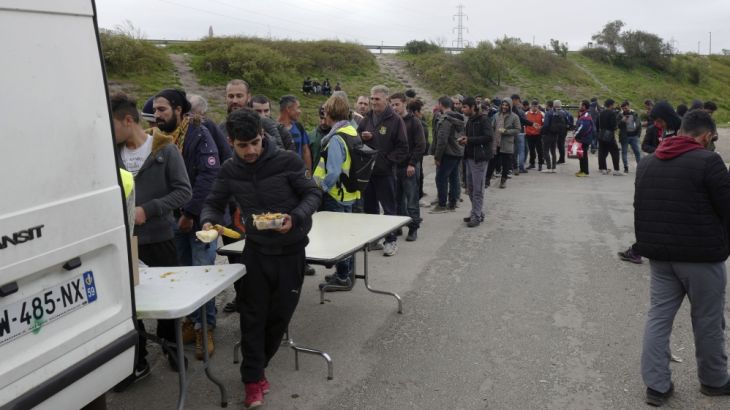Stranded in Calais: ‘This is not a life … We are human, we are human’
Did French President Emmanuel Macron’s visit offer a false sense of hope to asylum seekers?

Calais, France – An industrial zone in Calais is the setting for a gut-wrenching spectacle in Europe’s refugee crisis.
Here, on a wet, miserable Thursday, dozens stand out in the rain. Some kick about a bright green football. But for the most part, they stand around, clustered in small groups.
Keep reading
list of 4 itemsUN report charts lethal cost of migration over past decade
Conflict, climate, corruption drive Southeast Asia people trafficking: UN
Bodies of three Rohingya found as Indonesia ends rescue for capsized boat
They are the ones that are caught in asylum-seeking limbo. They have nowhere to live.
Most spend the night on the floor of sparse wood nearby, or on a roadside. And the harshness of their situation is etched in their faces.
This is not a life ... We are human, we are human.
One Ethiopian asylum seeker, who only gives me his first name, Abdico, has lost hope for a better life in Europe.
Abdico has been stranded in Calais for months. He and other Ethiopians describe the life they escaped in their homeland.
“I go to prison, we are very scared. There is a dictatorship,” he says in broken English.
He now wants to go to the UK and leave Calais far behind.
“We are sleeping without any food, in the roads maybe,” he says.
“Because the police … the police they disturb us. This is not a life … We are human, we are human,” he cries.
Volley of tear gas
Suddenly, there is shouting. We look up. One man has climbed on top of a pylon, screaming threats that he will thrown himself off of it.
He is directing his tirade at the 50 or so riot police officers, who have gathered nearby, forming a straight line.
Others are also agitated. In frustration, or hopelessness, they take discarded rocks and throw them at the police.
The response is a volley of tear gas fired at the crowd.
Many of the people who had gathered here did so hoping to get a warm meal. It is distributed by local charities who have been here for the past few years.
They are a crucial link for those who need food, clean water, warm clothing and access to health services.
But the standoff means it is too risky for the volunteers to help them.
Two people in the crowd are injured. The standoff calms down, but the tension continues to simmer.
The food that was supposed to be handed out goes back to the warehouse. The volunteers say it has to be given out tomorrow, or it will all have to be thrown out.
They think if they come to Calais they could be sent to the UK immediately. But we're not really sure how that would work
Volunteers from various groups share the same warehouse and provide different services. The challenge is enormous, particularly now that the jungle, the makeshift dwelling site that sprouted in Calais, was destroyed by French authorities last year.
While they agree that it was not, by any means, an ideal living situation for refugees and asylum seekers, now they are scattered all over the town, more vulnerable than ever.
False hope
Since French President Emmanuel Macron visited Calais and made a promise to work together with British Prime Minister Theresa May to better manage the border between the two countries, more people have arrived in the town.
They are mostly minors.
Volunteers believe that Mr Macron’s visit has fuelled expectations and have lead to rumours that it’s easier to cross to the UK now.
“People have false hope because of this misunderstanding,” says Rowan Farrell, cofounder of the Refugee Info Bus based at the Calais warehouse.
“There’s been no effort beforehand to explain to people what asylum entails in France, or what family reunification entails for people who are eligible for it in the UK.
“They think if they come to Calais they could be sent to the UK immediately. But we’re not really sure how that would work.”
Hope is hard to come by for those who have and continue to endure the worst refugee crisis in Europe since the Second World War.
For those who have made it this far from Afghanistan, Eritrea and other parts of the world rife with conflict and repression, it cannot end here, in a muddy, rain-sodden industrial estate in northern France.
The current situation is in danger of creating lost generations. A chance to work, have a family, live a normal life, in spite of all they have gone through is all they want.